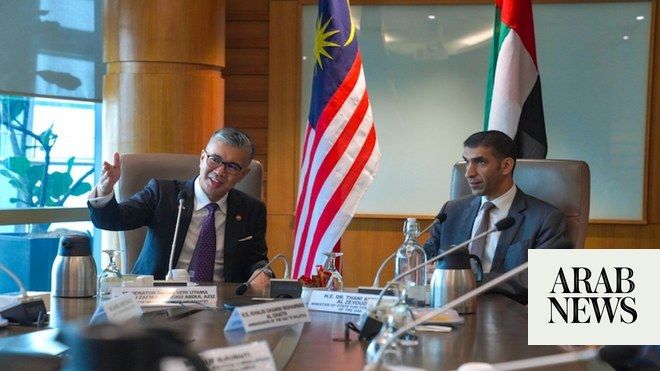Malaysia eyes UAE’s tech, clean energy sectors as free trade talks progress

KUALA LUMPUR: Malaysia is longing for stronger economic connections with the UAE, particularly in the technology and clean energy industries, affirmed the minister responsible for international trade of the Southeast Asian country. This comes as both parties are actively engaged in discussions on a trade agreement that promotes unhindered commerce.
The United Arab Emirates and Malaysia have decided to initiate conversations in the month of May. This decision was made when a delegation of ministers from the UAE, headed by Sheikh Khaled bin Mohamed bin Zayed Al-Nahyan, the crown prince of Abu Dhabi, visited Kuala Lumpur.
According to Tengku Zafrul Aziz, the Minister of International Trade and Industry in Malaysia, the agreement's terms of reference were officially completed and signed just last month. This update was shared with Arab News on Thursday.
He stated that the continuous discussion for the Malaysia-UAE Comprehensive Economic Partnership Agreement has great possibilities for both countries. Through promoting stronger economic connections, the CEPA can release a surge of trade and investment prospects that will drive growth and creativity.
By reducing trade obstacles, simplifying regulations, and improving market opportunities, Malaysian companies have the potential to broaden their market presence and increase their sources of income by entering the flourishing sectors of advanced technology, renewable energy, and tourism in the UAE.
The United Arab Emirates (UAE) is at the forefront of innovative approaches to energy transition, while Malaysia is making a transition from its reliance on traditional fossil fuel-centered economy to a more lucrative green economy. Malaysia has set an ambitious target of attaining net zero emissions by 2050.
In order to speed up the process, Kuala Lumpur initiated the initial stage of its national energy transition plan in July.
Aziz expressed his positive outlook regarding the CEPA framework's potential to stimulate a significant increase in foreign direct investment. This, in turn, would provide a much-needed impetus to the vast majority of businesses in Malaysia, which are small to medium-sized enterprises (SMEs).
He mentioned that companies from both countries are anticipated to see investing in each other's markets as an appealing and reliable prospect.
"These advancements are set to promote positive social results, particularly by offering advantages to the essential small and medium-sized enterprises that contribute significantly to Malaysia's economy."
The commerce between Malaysia and the UAE has been growing ever since the two nations upgraded their relationship to a strategic alliance in the previous year.
In the year 2022, the trade between UAE and Malaysia increased significantly from $5.4 billion to $8.8 billion, establishing UAE as Malaysia's top trading ally in the western Asian region.
As per Prof. Yeah Kim Leng, who oversees economic studies at the Jeffrey Cheah Institute on Southeast Asia, Malaysia's collaboration with the UAE aligns with its strategies to encourage direct investment and globalize micro, small, and medium-sized businesses.
"He informed Arab News that the enhancement of the economic alliance with the UAE aligns perfectly with Malaysia's recently introduced Madani economy framework."
Malaysia’s halal products have immense possibilities and are well-positioned to establish a presence in Middle Eastern markets by utilizing the UAE’s extensive network and connections within the region.
Sharmila Suntherasegarun, a leading research executive at the Institute for Democracy and Economic Affairs in Kuala Lumpur, expressed her belief that progress on the trade agreement is a positive move for Malaysia's endeavors to broaden its economic activities.
"By strengthening trade connections and engaging in strategic cooperation, this has the potential to act as a stimulant and generate further prospects for Malaysia to penetrate export markets in the Middle East, expanding towards North Africa and Europe," she expressed.
Considering the significant role that Malaysia plays in the export of halal products, which accounts for 7.4 percent of its GDP, partnering with the United Arab Emirates is expected to enhance its accessibility to global markets.
In addition, as the UAE's need for palm oil products continues to grow, Malaysia's continual efforts to strengthen and discover new markets for palm oil exports can be reinforced even more through this trade agreement.
Suntherasegarun also emphasized the possibility of UAE connections supporting Malaysia's energy goals.
She mentioned that the United Arab Emirates' ambitions in renewable energy and their desire to triple the amount of renewable energy aligns with Malaysia's environmental goals.
New advancements, like the official agreement between Masdar, a renewable energy enterprise owned by the UAE government, and Citaglobal Berhad from Malaysia to jointly work on solar, energy storage, and wind projects in Malaysia, indicate an increasing curiosity and possibility for expansion in Malaysia's energy sector.





